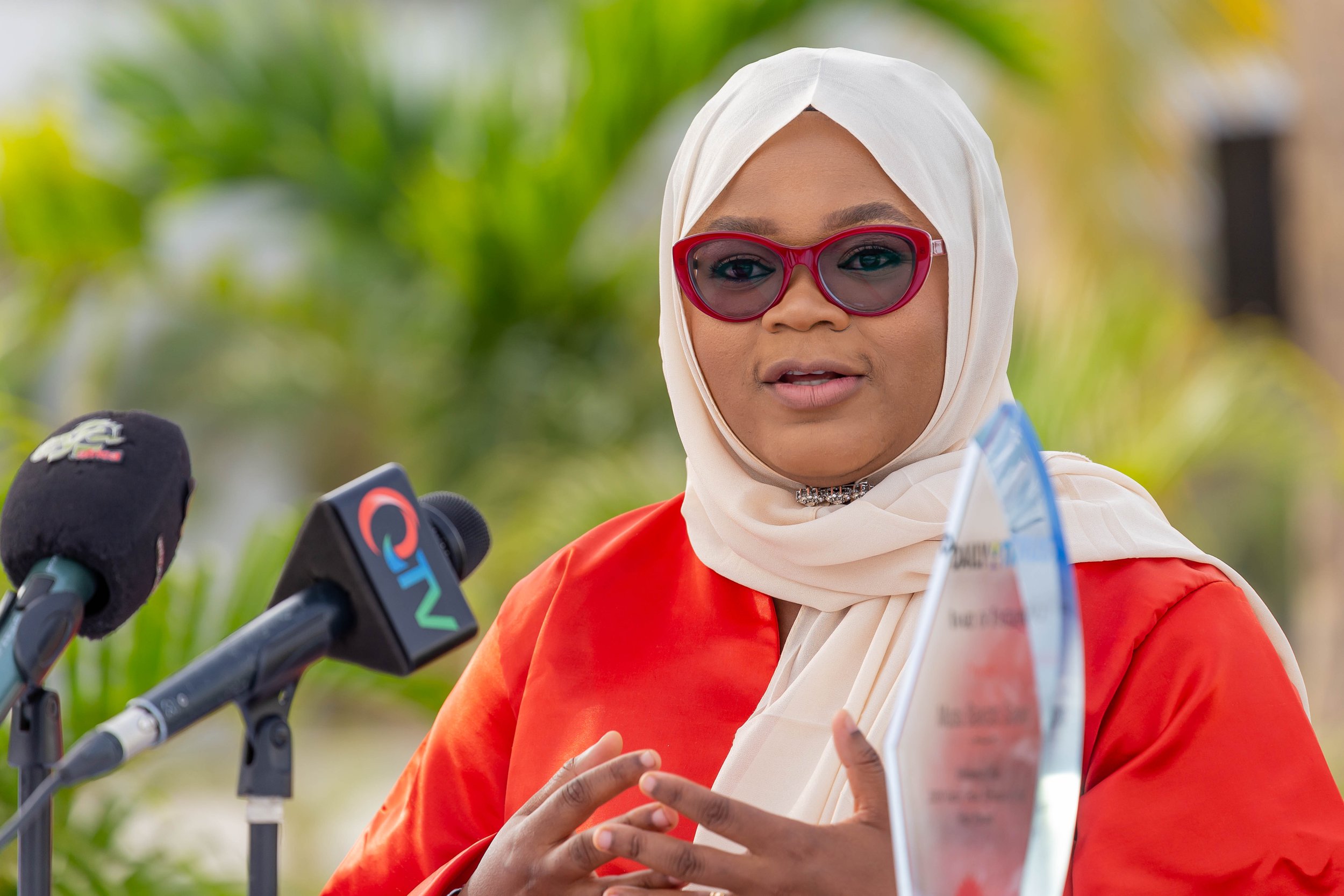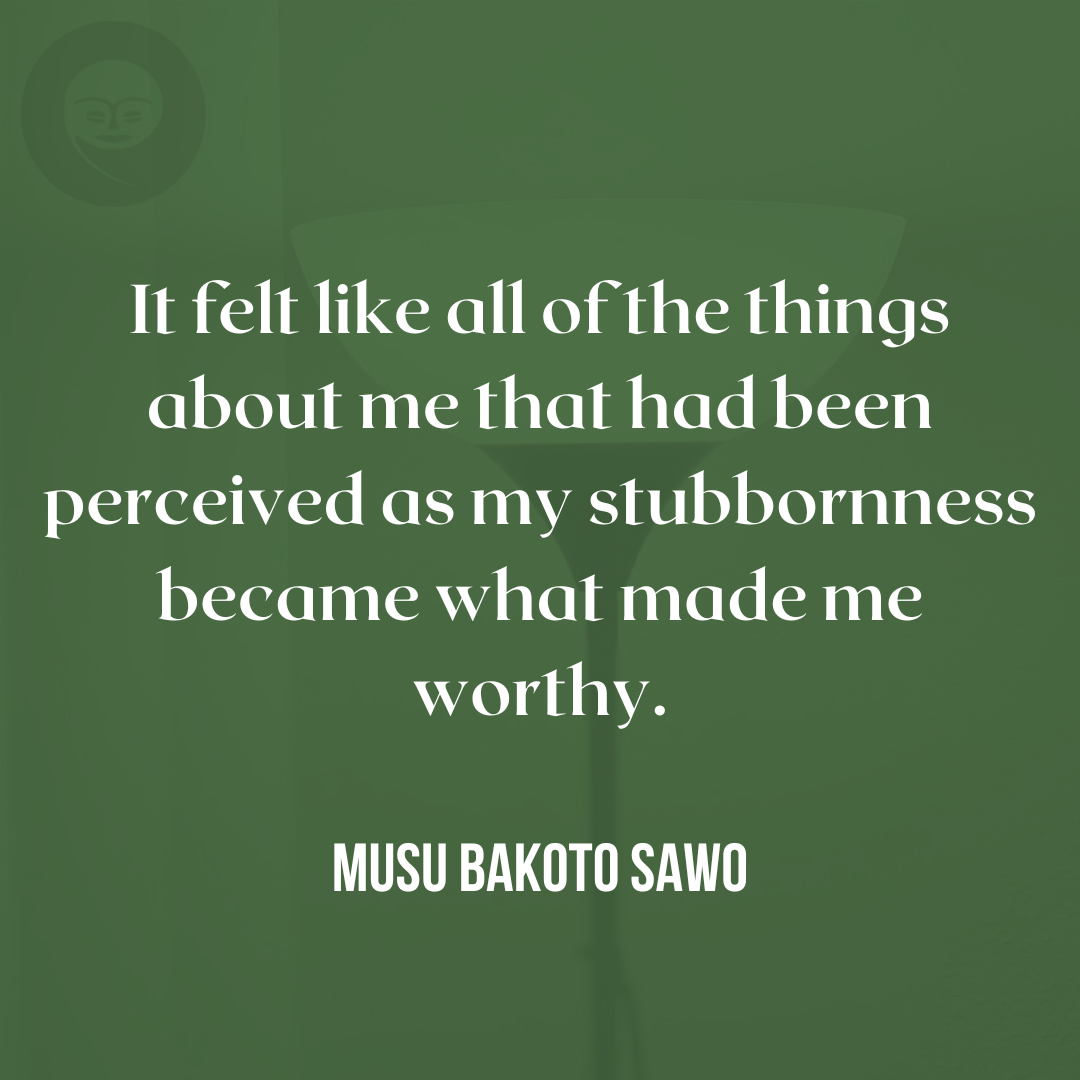“It is possible to come from nothing and make it in life” - Musu Bakoto Sawo (The Gambia) - 2/5
We are in conversation with Gambian lawyer and human rights defender Musu Bakoto Sawo, as part of our conversation series on Girls’ Resistance in West Africa. In the first part, Musu shared her definitions of girlhood and adolescence.
In this next part, we dig into the details of her life growing up as a girl in The Gambia. We talk about changes in social status, her fears, as well as the people who influenced her and the decisions she took.
Musu was first interviewed by Françoise Moudouthe in late 2019, as part of the global project documenting girls’ resistance. The conversation has been edited into this five-part interview by Jama Jack, for our #GirlsResistWA series. You can find out more about the series here.
Trigger Warning: This conversation contains mentions of violence and abuse which may be triggering for readers. Kindly take a moment to decide if you want to keep reading. If you do proceed, we encourage you to centre your wellbeing and stop reading at any point, as you need.
**********
Now that you’ve defined what age bracket counts as girlhood for you, let’s find out more about your life during that time. Where did you grow up?
I lived in two places [in The Gambia]. I grew up in Bakau, and then when I was about nine years old, I moved to Kanifing. These are the two places where I spent my childhood and grew up in.
And what is one of your fondest memories growing up in these two places?
I would say it was very exciting growing up in Bakau. For me, it was the best place for anyone to grow up in. Then, a misfortune happened where my family lost everything that we had. This forced us to move to our other house in Kanifing, and this was where my siblings and I grew up. This was a bit difficult because it was a shift in social status, where we used to have something and now, we don’t have that anymore.
That was challenging for me because I had had a great life, and now there was that complete overnight shift. Kanifing was mainly a place for the elite and middle-class rich people. We still had a house there, but it was incomplete and not quite up to standard. People would come to the house looking for maids to hire, because at the time, incomplete buildings were often occupied by people who were either watching over the building or people who worked as maids or took other menial jobs.
How did that experience make you feel? What was it like going through that brutal transition?
As a child, I didn't understand why this had happened, so it was a mix of feelings. It made me a bit sad. I couldn't understand what was happening. It was like my father was able to provide for us, and suddenly, he didn't have the means to do that anymore. I saw him sitting at home and trying to do other jobs just to make sure that we had food on the table. I also saw my mother go from being a stay-at-home mom to owning a garden where she tried to grow crops which she would harvest and sell.
Of course, when I grew much older, I understood some of these things, but it was really a challenge at the time.
So far, you’ve mentioned a lot of hardships in your life as a girl. Looking back, was there something that brought you fun and joy at the time?
I loved doing public speaking and advocacy. I represented my school on so many platforms and competitions. I was always called a great public speaker and I received several awards for public speaking.
When I was about nine years old, I joined a child-led organisation called Voice of the Young. It was under the auspices of the Child Protection Alliance in The Gambia. Being part of the organisation and having the opportunity to meet children across the country, participating in competitions, speaking, and representing children of The Gambia at events or national platforms brought me so much joy.
It felt like all of the things about me that had been perceived as my stubbornness became what made me worthy. There was a name for it: I was an activist. I was fighting for things from a very early age that people didn't have a name for but being part of that organisation helped to shape my understanding of the things that I was already doing.
And when we flip the coin, what made you afraid or angry?
Just the uncertainties of not being able to complete school because my parents wouldn't be able to afford it anymore. Those were things that really scared me. Sometimes, not getting the materials that I needed for school was also something that scared me. There was a point during that time where I couldn't get the things I needed. I would either study very hard to become top of my class and win awards, which included school materials at my school’s prize-giving days, or I would hope for a kind relative to buy me a school bag. These were all luxury items at some point in my life.
You know, I've always known what I wanted to be when I grew up. It might have shifted a bit, but I've always known. However, the uncertainties meant that I didn’t know if I could achieve this. It was a challenge because I had to balance doing my extracurricular activities with academics and helping out at home. When I closed from school, I would go to my mom's garden with my siblings to help her with watering the plants. When she harvested her produce, I had to help with selling them at the market. Trying to balance all of that with school - which is what I loved the most - was a challenge for me because it was too much for a child.
Who would you say were the most important people in your life during that period of girlhood and adolescence?
The people in my life were mainly the ones that I associated with at the level of the child rights organisation that I was a part of. I made many friends there, and I also made friends while in school. Of course, there was my family. My mother, siblings, and I are very close. These were the people who were in my life at that point.
My mother played a big role, as well. She wasn't educated. She was a housewife and was the type who never said any word to my father, and never spoke back at him. I’ve never seen her fight back, despite whatever wrong my father might have done to her. I think that also shaped my views of what kind of woman I wanted to be. I knew that I didn't want to be a woman who didn't have a voice. I loved my mother, and I was happy that she was doing everything that she possibly could to make sure that we got the education that she never had. Yet, the experience of seeing her life daily made me have a choice of not being that kind of woman.
And who were the people that had a negative influence over your life? What was your relationship with them?
There was a shift in how people looked at me due to the change in our social status. Children can be mean to each other, and some children would laugh at me when I didn't, in their opinion, wear the most appropriate outfit to a party or when I went to school with worn-out shoes.
Sometimes, there would be a party in the school, but I wouldn't want to go because I didn't have a new outfit, or the clothes I had were not suitable for that event. However, I remember that my mom would tell me how stunning I looked in my outfits, and that I should go to the parties. So, when people were wearing their European dresses, I most likely would wear my African dresses because that was what I had.
Sometimes, the kids would laugh at me; at other times, it was perfectly fine. But these were challenging times for me, as a child. They would laugh at me to the extent that, on some days, I wouldn't want to go to school.
I've always known what I wanted to be when I grew up. It might have shifted a bit, but I've always known.
Let’s zoom out of your immediate circles for a second and look at what was happening in your community, your country, or the world at the time you were a girl. Do you remember something that possibly made an impact on your life and fired up this desire in you?
Seeing that The Gambia had a Vice President who was a woman changed my story, because I saw that women could go beyond the domestic framework, and that there is an opportunity for us out there. That was when I reassured myself that I would be one of those strong and powerful women. I remember one time I was being interviewed, and I was asked what I wanted to be. I said that I wanted to be the Vice President of The Gambia.
So, seeing the kind of woman that my mother was, in addition to being inspired by our country having a female Vice President, shaped my life. These are the events that made me want to do better and know that it is possible to come from nothing and make it in life. Sometimes, it’s about the choices we make, and even though it could be difficult, those were things that I was ready to face and deal with because I wasn't going to give up anymore.
Did Musu realise her vision? What challenges did she face getting there? In the third part of our conversation, she shares her experiences as a child bride and the choices she had to make. Read Part 3 here.



